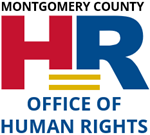Compliance Section

The Compliance Section is the civil rights enforcement operation of the Office of Human Rights. It has jurisdiction over private employers in Montgomery County (including the Montgomery County Government), real estate transactions (both housing and commercial real estate), and places of public accommodation. The Compliance Section receives, investigates and resolves formal complaints of discrimination. The Compliance Section specifically enforces Montgomery County Code, Chapter 27, Article 1.
Types of Complaints:
- Employment Complaints are accepted based on race, color, religious creed, ancestry, national origin, marital status, age, sex, sexual orientation, disability, genetic status, family responsibilities, and gender identity.
- Real Estate Complaints are accepted on the bases of race, color, age, religious creed, sex, sexual orientation, national origin, ancestry, disability, marital status, source of income, presence of children, family responsibilities, and gender identity.
- Public Accommodation Complaints are accepted on the bases of race, color, national origin, ancestry, sex, sexual orientation, disability, marital status, religious creed, and gender identity.
-
Penalties and relief
Damages not exceeding $500,000 for humiliation and embarrassment, based on the nature of the humiliation and embarrassment, including its severity, duration, frequency, and breadth of observation by others;*
*Editor’s note—Subparagraph (E) of Sec. 27-8(a)(1) was amended by 2005 L.M.C., ch. 29, § 2 (Bill 36- 04). However, in American Financial Services, et. al. v. Montgomery County, (Civil Action No. 269105), the Court declared Bill 36-04 “null and void” by order dated 11/30/06. Prior to 2005 L.M.C., ch 29, subparagraph (E) read as follows: (E) up to $5,000 for humiliation and embarrassment, based on the nature of the humiliation and embarrassment, including its severity, duration, frequency, and breadth of observation by others
A structured intake process evaluates and validates intake inquiries. Once a complaint is accepted, both parties are offered mediation. If either or both parties decline mediation, or if mediation fails, cases are investigated and resolved or settled with the findings on the merits of the complaint. The Commission has the authority to order relief and penalties. A de novo public hearing (administrative trial) is mandatory for those discrimination cases that cannot be voluntarily settled after a finding of discrimination.
Complaint Questionnaires:
Please use the questionnaire below to submit information about your experience. Questionnaires are designed for intake use only and are not considered a formal complaint. A formal complaint must be approved at the intake stage, then signed and notorized.
Inquiries and/or questions concerning possible violations can also be made by calling 311.Do You K now Your Rights? We Are Here To Help. If you feel you have been discriminated in employment; real estate; housing; public accommodations; intimidation; race; gender identity; color; religious creed; genetic status; age; disability; or sexual orientation contact the Montgomery County Office of Human Rights at 240-777-8450. Inquries and/or questions concerning possible violations can also be made by calling 311.
Earned Sick and Safe Leave Law
What You Need to Know About Montgomery County's New "Earned Sick and Safe Leave Law"- Download Earned Sick and Safe Leave Poster Here ( English) ( Spanish) - Fact Sheet
- Download Article XIII. Earned Sick and Safe Leave Law
- Paid Parental Leave Added to Montgomery County's Sick and Safe Leave Law
Review the new law and a copy of the signed legislation . If you have additional questions or need further information please call 240-777-8490 or email [email protected]
Montgomery County’s new Earned Sick and Safe Law went into effect on Oct.1, 2016. It will require most employers in the County to provide earned sick and safe leave to employees for work performed in the County.
The intent of the law is to provide employees with paid leave or time off to take care of things such as sickness, family illnesses or domestic violence. It helps to ensure that workers do not have to make a choice between keeping a job and going to work sick or not being able to have time to find a safe living environment. The bill is expected to provide support to our lowest income and most vulnerable workers.
The legislation requires employers to provide earned sick and safe leave at a rate of at least one hour for every 30 hours an employee works in the County up to 56 hours in a calendar year. To help small businesses, an employer with fewer than five employees would have to provide an employee with up to 32 hours of paid sick and safe leave per year plus an additional 24 hours of unpaid sick and safe leave. Many County employers already meet or exceed the benefits required by the new law and are unaffected by the new law.
Employers are required to give employees written notice that they are entitled to earned sick and safe leave under the new law. The notice must include a statement of how sick and safe leave is accrued, the permitted uses of earned sick and safe leave, a statement that the employer must not retaliate against an employee for exercising the rights established by the law.
Minimum Wage Information
Most employees must be paid the Montgomery Co. Minimum Wage Rate. Employees age 18 and under working under 20 hours per week are exempt from this rate.Tipped Employees (earning more than $30 per month in tips): must earn the Montgomery Co. Minimum Wage Rate per hour. Employers must pay at least $4.00 per hour. This amount plus tips must equal at least the Montgomery Co. Minimum Wage Rate.
Amusement and Recreational Establishments (who meet certain requirements): must pay employees at least 85% of the State Minimum Wage Rate.
Employees under 20 years of age: must earn at least 85% of the State Minimum Wage Rate for the first 6 months of employment.
- Maryland Minimum Wage and Overtime Law-Montgomery County Information Sheet ( Spanish Version)
- Montgomery County Council Public Hearing, Bill 12-16, Human Rights and Civil Liberties- County Minimum Wage –Amount- Annual Adjustment (Video)
Employment Guide for Domestic Workers
Are you a domestic worker? Domestic workers are people who work in a private home at jobs like cleaning, cooking, laundry, caring for a child, or caring for someone who is sick or elderly. Outside the house, they may do gardening or driving. If you do any of these things on a regular basis, you are a domestic worker. If so, this brochure is for you . This brochure was written to help domestic workers like you know your rights. Whether or not you have legal immigration status, almost all of the laws that protect workers in Maryland apply to you.Find more information from the following link(s):
Domestic Workers Law
The
Domestic Workers Law
was the result of a three year campaign by domestic workers and advocacy groups to help improve the working conditions for domestic workers. The law requires employers of certain domestic workers to negotiate and offer a written contract that discloses specific information regarding job conditions and benefits. The law also prohibits retaliation against a domestic worker who requests a written contract, attempts to enforce the terms of a contract, or files a complaint or participates in an investigation of a complaint. Council members George Leventhal and Marc Elrich were the primary sponsors of this bill which was passed unanimously by the Council and signed by County Executive Ike Leggett.
"This legislation was intended to level the playing field between domestic workers and their employers," states Eric Friedman, Director, OCP. "The model employment contract ensures that domestic workers and employers discuss their expectations in critical areas such as wages, job duties, work schedules and employment benefits. By formalizing the relationship, each party should have a clear understanding of their responsibilities."
Montgomery County Office of Consumer Protection enforces the law and publishes a model employment contract and a model disclosure statement that employers can use to comply with this law. The contract and disclosure statement are available in English, French, and Spanish.
Ban the Box
Ban the Box, or the Fair Criminal Record Screening Standards Law , assists in the successful reintegration into the workforce people with criminal records by removing improper barriers to employment. The law helps to make sure that employers make hiring decisions based on relevant work qualifications without improperly considering a person’s criminal record. The law does this by restricting when during the application process an employer can inquire about someone’s criminal history.Gender-Inclusive Single-User Restrooms
Gender-inclusive signage means a sign or display identifying a restroom that does not indicate a specific gender or contains descriptive language, such as “restroom”, “bathroom”, or “toilet”, or a picture or icon indicating the restroom’s availability for use by any individual regardless of gender or gender identity. A gender-inclusive signage may include a picture or icon of a toilet.
Public single-user restroom means a single-occupancy restroom for public use with at least one toilet and an entry door that can be locked from the inside by the occupant. A public single-user restroom does not include a private restroom in a residence, hospital, inn, hotel, motel, or restrooms that are only accessible from a private room or office.
A public single-user restroom, existing or newly built, in a place of public accommodation or County-owned building, must be:
- made available for use by individuals of any gender; and
- identified with gender-inclusive signage.
Enforcement and Penalties
- Who may enforce. The following have the authority to enforce this Section:
- The Department of Permitting Services;
- The Department of Health and Human Services; and
- any other agency designated by the Chief Administrative Officer.
- A person authorized to enforce this Section must not issue a citation unless the violation still exists days after an initial notice of violation.
- A violation of this Section is a Class A violation.
